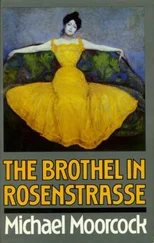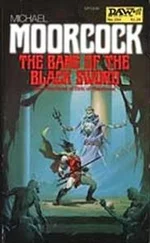Michael Moorcock - The Dreamthief's Daughter
Здесь есть возможность читать онлайн «Michael Moorcock - The Dreamthief's Daughter» весь текст электронной книги совершенно бесплатно (целиком полную версию без сокращений). В некоторых случаях можно слушать аудио, скачать через торрент в формате fb2 и присутствует краткое содержание. Жанр: Фэнтези, на английском языке. Описание произведения, (предисловие) а так же отзывы посетителей доступны на портале библиотеки ЛибКат.
- Название:The Dreamthief's Daughter
- Автор:
- Жанр:
- Год:неизвестен
- ISBN:нет данных
- Рейтинг книги:4 / 5. Голосов: 1
-
Избранное:Добавить в избранное
- Отзывы:
-
Ваша оценка:
- 80
- 1
- 2
- 3
- 4
- 5
The Dreamthief's Daughter: краткое содержание, описание и аннотация
Предлагаем к чтению аннотацию, описание, краткое содержание или предисловие (зависит от того, что написал сам автор книги «The Dreamthief's Daughter»). Если вы не нашли необходимую информацию о книге — напишите в комментариях, мы постараемся отыскать её.
The Dreamthief's Daughter — читать онлайн бесплатно полную книгу (весь текст) целиком
Ниже представлен текст книги, разбитый по страницам. Система сохранения места последней прочитанной страницы, позволяет с удобством читать онлайн бесплатно книгу «The Dreamthief's Daughter», без необходимости каждый раз заново искать на чём Вы остановились. Поставьте закладку, и сможете в любой момент перейти на страницу, на которой закончили чтение.
Интервал:
Закладка:
As the Nazi grip tightened, fewer and fewer of us spoke out, or even grumbled. The storm troopers were everywhere. They would arrest people on an arbitrary basis "just to give them a taste of what they'll get if they step out of line." Several journalists I knew, who had no political affiliations, were locked up for months, released, then locked up again. Not only would they not speak when they were released, they were terrified of speech.
Nazi policy was to cow the protesting classes. They succeeded fairly well, with the compliance of the church and the army, but they did not entirely extinguish opposition. I, for instance, determined to join the White Rose Society, swore to destroy Hitler and work against his interests in every way.
I advertised my sympathies as best I could and was eventually telephoned by a young woman. She gave her name as "Gertie" and told me that she would be in touch as soon as it was safe. I believed they were probably checking my credentials, making sure I was not a spy or a potential traitor.
Twice in the streets of Bek I was pointed out as an unclean creature, some kind of leper. I was lucky to get home without being harmed. After that, I went out as little as possible, usually after dark. Frequently accompanied by my sword. Stupid as it sounds, for the storm troopers were armed with guns, the sword gave me a sense of purpose, a kind of courage, a peculiar security.
Not long after the second incident, when I had been spat at by brownshirt boys, who had also attacked my old manservant Reiter as an aristocrat's lackey, those bizarre, terrifying dreams began again. With even greater intensity. Wagnerian, almost.
Thick with armor and heavy warhorses, bloody banners, butchering steel and blaring trumpets. All the potent, misplaced romance of conflict. The kind of imagery which powered the very movement I was sworn to fight.
Slowly the dreams took shape and in them I was again plagued by voices in languages I could not understand, full of a litany of unlikely, tongue-twisting names. It seemed to me I was listening to a long list of those who had already died violent deaths since the beginning of time-and those who were yet to die.
The resumption of my nightmares caused me considerable distress and alarmed my old servants who spoke of fetching the doctor or getting me to Berlin to see a specialist.
Yet before I could decide what action to take, the white hare appeared again. She ran swiftly over corpses, between the legs of metal-covered men, under the guns and lances of a thousand conflicting nations and religions. I could not tell if she wished me to follow her. This time she did not look back. I longed for her to turn, to show me her eyes again, to determine if she was, in fact, a version of myself-a self freed at last from that eternal struggle. It was as if she signaled the ending of the horror. I needed to know what she symbolized. I tried to call out, but I was dumb. Then I was deaf. Then blind.
And suddenly the dreams were gone. I would wake in the morning with that strange feeling of rapidly fading memory, of a vanishing reality, as a powerful dream disappears, leaving only the sense of having experienced it. A sense, in my case, of confusion and deep, deep dread. All I could remember was the vision of a white hare racing across a field of butchered flesh. Not a particularly pleasant feeling, but offering a relief from that nightly conflict.
Not only my nightmares had been stolen, but also my ordinary, waking dreams, my dreams of a lifetime of quiet study and benign action. Such a monkish life was the best someone of my appearance could hope for in those days which were merely an uneasy pause in the conflict we began by calling the Great War to end wars. Now we think of it as an entire century of war, where one dreadful conflict followed another, half of them justified as holy wars, or moral wars, or wars to help distressed minorities, but almost all of which were actually inspired by the basest of emotions, the most short-term of goals, the crudest greed and that appalling self-righteousness which no doubt the Christian Crusaders had when they brought blood and terror to Jerusalem in the name of God and human justice.
So many quiet dreams like mine were stolen in that century. So many noble men and women, honest souls, were rewarded only with agony and obscene death.
Soon, thanks to compliance of the church, we were privileged to see in Bek's streets pictures of Adolf Hitler, Chancellor of Germany, dressed in silver, shining armor and mounted on a white horse, carrying the banner of Christ and the Holy Grail, recalling all the legendary saviors of our people.
These bigoted philistines despised Christianity and had made the swastika the symbol of modern Germany, but they were not above corrupting our noblest idealism and historical imagery to further their evil.
It is a mark, I think, of the political scoundrel, one who speaks most of the people's rights and hopes and uses the most sentimental language to blame all others but his own constituents for the problems of the world. Always a "foreign threat," fear of "the stranger." "Secret intruders, illegal aliens ..."
I still hear those voices in modern Germany and France and America and all the countries we once thought of as far too civilized to allow such horror within their own borders.
After many years I still fear, I suppose, a recurrence of that terrible dream into which I finally plunged. A dream far more real than any reality I had known, a dream without end. A dream of eternity. An experience of the complexity of our multiverse in all its vast, limitless variety, with all its potential for evil and its capacity for good.
Perhaps the only dream that was not stolen from me.
Chapter Two
Uninvited Relatives
I was still waiting for another call from "Gertie" when in the early months of 1934 I had an unexpected and rather alarming visitor to Bek. My people are related through marriage and other kinships to the traditional rulers of Mirenburg, the capital of Waldenstein, which the Nazis, and later the Soviets, would annex. Although predominantly of Slavic stock, the principality has for hundreds of years been culturally linked to Germany through language and common concerns. It was my family's practice to spend the Season in Mirenburg at least. Some members, such as my rather unwholesome Uncle Rudy, disgraced in Germany, chose to live there almost permanently.
The rulers of Mirenburg had not survived the tenor of the century. They, too, had known civil war, most of it instigated by foreign interests who had always sought to control Waldenstein. The Badehoff-Krasny family had been restored to power, but more as clients of Austria than as independent rulers. They had married into the von Mincts, one of the great Mirenburg dynasties.
Hungary, of course, also possessed an interest in the tiny country. The current Prince of Waldenstein was my cousin Gaynor, whose mother had been one of the most beautiful women in Buda-Pest and was still reckoned a powerful political mind. I knew and admired my aunt. In middle years she was an impressive woman, maintaining her adopted country with all the skills of a Bismarck.
She was ailing now. The rise of fascism had shocked and exhausted her. Mussolini's successes were an abomination to her, and Hitler was inconceivably shallow and vicious in his political rhetoric, his ambitions and claims. But, as she said when last I saw her, Germany's soul had been stolen already. Hitler was merely addressing the corpse of German democracy. He had killed nothing. He had grown out of the grave, she said. Grown out of that corpse like an epidemic which had rapidly infected the entire country.
"And where is Germany's soul?" I asked. "Who stole it?"
"It's safe enough, I think." She had winked at me, crediting me with more wit than I possessed. And that was all she had said on the subject.
Читать дальшеИнтервал:
Закладка:
Похожие книги на «The Dreamthief's Daughter»
Представляем Вашему вниманию похожие книги на «The Dreamthief's Daughter» списком для выбора. Мы отобрали схожую по названию и смыслу литературу в надежде предоставить читателям больше вариантов отыскать новые, интересные, ещё непрочитанные произведения.
Обсуждение, отзывы о книге «The Dreamthief's Daughter» и просто собственные мнения читателей. Оставьте ваши комментарии, напишите, что Вы думаете о произведении, его смысле или главных героях. Укажите что конкретно понравилось, а что нет, и почему Вы так считаете.








